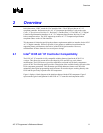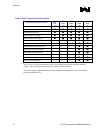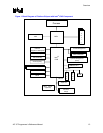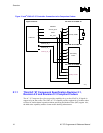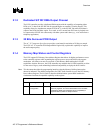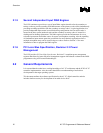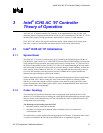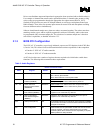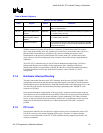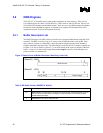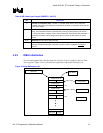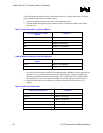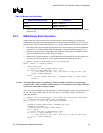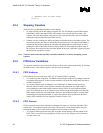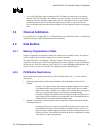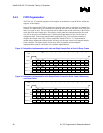
Intel® ICH5 AC ’97 Controller Theory of Operation
R
AC ’97 Programmer’s Reference Manual 19
Table 4. Modem Registers
Device 31 Function 6 Modem
Offset Register Default Comments
04h-05h Command (COM) 0000h Bit 2: Bus Master Enable
Bit 0: I/O Space Enable
10h-13h Native Audio Mixer Base
Address
00000001h Address in the 64-K I/O space that allows 256 bytes of registers not
in conflict with any other set
14h - 17h Native Audio Bus
Mastering Base Address
(MBAR)
00000001h Address in the 64-K I/O space that allows 256 bytes of registers not
in conflict with any other set
3Ch Interrupt Line (INTLN) 00h A hardware interrupt (0-Fh) that follows value assigned to PIRQB#.
Has not effect on ICH5 it is used to indicate software the IRQ value
assigned to the device.
With the exception of register 41h on Device 31 Function 5, initialization of the PCI registers
above is the responsibility of the PnP capable OS. If a PnP OS is not available in the system, it is
then the BIOS’s responsibility to configure all PCI devices including the registers above.
Determination of the presence of PnP capable OS is usually made via a switch in the System
Setup. However, the final configuration or the existence or not of this switch is implementation
dependent.
The ICH5 AC’97 controllers also provide PCI Power Management functionality. PCI Power
Management Registers are available via the configuration space. Handling of the Power
Management registers is responsibility of the OS PCI Bus driver following standard procedures.
For further discussion on the usage model for this registers, refer to Section 3.6, Power
Management.
3.1.4 Hardware Interrupt Routing
The audio and modem functions in the ICH5 internally share the same PCI IRQ (PIRQB#). The
configuration software must take this into account and assign the same IRQ pin to both functions.
Sharing IRQs increases the ISR latencies. Each ISR must determine if the interrupting device is the
one serviced by the routine, as determined by the OS programming model. PIRQB# it is also
exposed as a PCI IRQ.
In an environment where a high Quality of Service (QoS) is required, system designers must pay
close attention to devices attached to the same PIRQ. Software driven signal processing functions,
as in the case of software driven modem and audio, require maintaining a low latency interrupt
service in order to maintain proper functionality. Software driver programmers need to pay close
attention to the ISR latencies and make use of Deferred Procedure Calls (DPC) as much as
possible.
3.1.5 PCI Lock
Note that host controllers are not required to support exclusive-access mechanisms (such as PCI
LOCK) for accesses to the memory-mapped register space. Therefore, if software attempts
exclusive-access mechanisms to the AC ’97 host controller memory-mapped register space, the
results are undefined.



